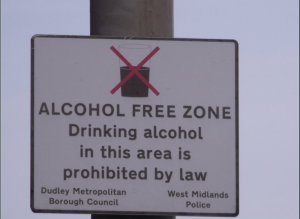By Lilia Combs

Underage drinking can have serious implications that may not show up until later in a person’s life. Using alcohol at a young age can impact how a teen’s brain develops, disrupt sleeping patterns, delay puberty, make it more difficult to concentrate at school, and even increase the risk for liver and heart disease, high blood pressure, and certain types of cancer.
“I hear about people drinking before coming to school all the time – almost every day,” sophomore Tillie Moss said. “Those same people also tell me that it’s hard for them to concentrate and stay awake in class.”
On top of that, there are also emotional and behavioral consequences with underage drinking. Alcohol use can affect a teen’s mood and personality, trigger depression, anxiety, or suicidal thoughts. It can also lead to an increase in risky behavior such as driving while impaired or fighting. People who have overdrank alcohol may stagger, lose their coordination, and slur their speech. Depending on the person, intoxication can make someone very friendly and talkative or very aggressive and angry. Reaction times are slowed dramatically; people who are intoxicated may think they’re moving properly when they’re not. They may act differently than they usually do.
When large amounts of alcohol are consumed in a short period of time, alcohol poisoning can occur. Alcohol poisoning is exactly what it sounds like — the body has become poisoned by large amounts of alcohol. Violent vomiting is usually one of the first symptoms of alcohol poisoning. Extreme sleepiness, unconsciousness, difficulty breathing, dangerously low blood sugar, seizures, and even death may result.
Kids and teens are more likely to binge drink and are more vulnerable to developing a problem with alcohol than adults. Experts believe this may be because the pleasure center of a teen’s brain matures before their capacity to make sound decisions. They’re able to experience pleasure from alcohol before they’re able to make the right choices about when and how much to drink. This can lead teens to do things that are at best embarrassing, and at worst life-threatening to themselves or others. There are a myriad of reasons why teens may try drinking. Whether it is an act of rebellion or defiance, a natural curiosity, or peer pressure and environmental influences, teens may experience a pull to drink.
“Drinking is portrayed as the cool thing to do as a teenager, and you’re lame if you don’t according to the majority,” Pine Forest sophomore Mathias Calvillo said. ”I don’t think people understand the effects drinking can have on their life.”
If all your friends drink and you don’t want to, it can be hard to say “no.” No one wants to risk feeling rejected or left out. Different strategies for turning down alcohol work for different people. Some people find it helps to say no without giving an explanation; others think offering their reasons works better. Saying is always acceptable, and you should not have to feel uncomfortable respecting your own boundaries. That being said, if saying no to alcohol makes you feel uncomfortable in front of people you know, blame your parents or another adult for your refusal. Saying, “My parents are coming to pick me up soon,” or “My coach would kill me,” can make saying no a bit easier for some.
“My favorite excuse to use is the classic, ‘My mom is mad at me so I need to leave,” Chaminade senior Bella Pivo said,” it works every time and no one ever argues with it.”
If someone feels as though they have an alcohol addiction, It can be hard to talk about their issues, but a supportive person in a position to help can refer students to a drug and alcohol counselor for evaluation and treatment. In some states, this treatment is completely confidential. After assessing a teen’s problem, a counselor may recommend a brief stay in rehab or outpatient treatment. These treatment centers help a person gradually overcome the physical and psychological dependence on alcohol and lead to an overall better life.
Most people have had at least 1 drink by the ages of 14-15-year-old. In 2019, 7.0 million young people ages 12 to 20 reported that they drank alcohol beyond “just a few sips” in the past month. When it comes to mental health and overall well-being, it may be tempting to indulge in substances to help ease struggles. It is important to stop and think about the consequences you will be giving your body and your future before picking up a bottle.











